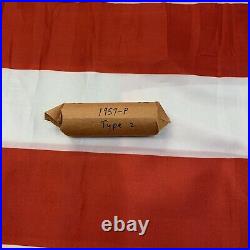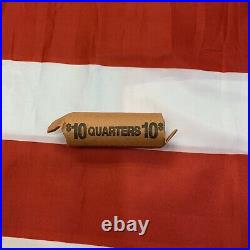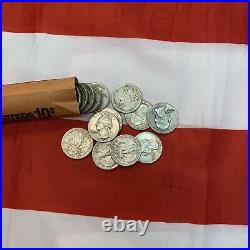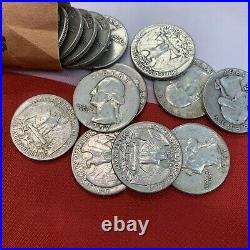




These 1957 quarters are all the Type B reverse. Type B reverse is where the mint used left over dies from the proof sets of 1957 to strike business strike coins. We don’t know why this distinct and easily identifiable variety is not in the Redbook. It it was ever listed in the Redbook the value would skyrocket. Most collectors, even dealers, don’t know that this variety exists. It is only a matter of time before the Redbook lists this variety. OUR MAIN GOAL and FOCUS IS YOUR SATISFACTION and TRUST. Please read our FULL description/presentment below before ordering. Regarding the Condition of the Packaging of Proof and Mint Sets. PROOF AND MINT SETS ARE THE BEST COINS THE U. Our sets are above market standards as traded between dealers. These sets have passed through one or more hands since they left the mint. None of the imperfections in the outer wrappers affect the condition of the coins enclosed. Sets from 1955 to 1967 are over a half century old while sets from 1968 to 1984 are 1/3 of a century old. The outer wrappers are literally paper thin and have been handled by previous owners who opened these wrappers to look at their coins. Even the paper “boxes”/wrappers of very recently issued sets will show that the box has been opened if you CAREFULLY open and close it one time. Grading services do not value the wrappers in which the coins are housed. They do not grade them. In fact, they are responsible for destroying 10’s of thousands of them each month as they break them open to grade the coins enclosed. The coins have value. The wrappers do not. We will answer any question you have as to the condition of the wrapper you will receive. They will all be in some state of used condition. The hard plastic cases are subject to small stress fractures either when originally encased or as they age. ALL proof and uncirculated sets will show some sign of interaction with micro atom contaminants over time (toning) if you put “enough” magnification on each coin in any proof and mint set. Here is a copy of the note placed in early mint-sealed proof sets by the Mint Superintendent beginning in 1956. Proof Coins–have been carefully inspected before release! If there should appear–what may seem to you–a defect or a scratch on a coin–it is no doubt a crease in the polyethylene-coated cellophane in which they are encased. We tell you this to save us both unnecessary correspondence. (over) Sooner or later your Proof Coins may show evidence of oxidation (tarnish or discoloration). We have chosen materials and methods of packing that we hope will delay this possibility, but we cannot assume responsibility for oxidation. Please do not ask us to make exchanges or adjustments. IF THE SUPERINTENDENT OF THE MINT PLACED THIS NOTE IN PROOF SETS OF COPPER AND SILVER IN THE YEAR OF ISSUE, IMAGINE THE “TONING” OR CHANGES IN COLOR THAT NORMALLY OCCURS IN U. PROOF/MINT SETS OVER THE YEARS. Please do not expect your proof/mint coins to look as they did the day the mint struck them. From the moment they are struck the metal begins to interact with the catalysts of air, light, temperature, and atoms in the air and the micro contaminants that may be in the airtight hermetically sealed proof/mint sets themselves. The irony is that there is a big market with big premiums for the most “colorful” toning that some of these conditions produce. If you have any questions/concerns about proof/mint set condition, please message us prior to paying for your order. General Information, Policies, and Frequently Asked Questions. PLEASE allow us the opportunity to address any possible mistake made. We guarantee authenticity only. Any grades are our opinion. We use the term “high grade” when we believe a coin is in the upper 20% of the surviving population. We use the term “better grade” when we believe a coin is in the upper 50% of the surviving population. We use the word “detail” that coin grading services use to alert buyers when we believe a coin may have a more than average environmental defect. We are always willing to give you our opinion of any coin. We spend thousands of dollars per week producing pictures on the obverse and reverse of each coin we sell. These pictures should be sufficient to ensure your satisfaction. Ask questions before you pay to ensure satisfaction. 75 for each additional single coin. Prestige, Premier, and sets after 2006 cost more. If the invoice you receive from us exceeds your price point you can simply ask us to cancel the sale before paying for it. We offer you the convenience all proof sets from 1955 to date and all mint sets from 1959 to date. Grading by third parties. Three coin dealers might agree on the grade of a coin if two of them were dead. As I write this I have three coins in grading plastics by “the most prominent” grading companies. One is a 1915-d penny in a BU holder described as a 1915-s. One is a high grade type one standing liberty quarter described as a type two. Another is a 1928 peace dollar graded AU with more damaging file marks on the reverse than you can accurately count. We have never sent a coin to a grading service. I have had a local dealer send a few coins in for customers and through him we did an experiment in 2007. We sent a beautiful BU 1942/1-d dime in for grading to the “big three” at the time. It came back graded from AU to high grade BU. Then we sent it back a second time to the same grading service and they were 3 grades off from their first grade. He had it re-graded and it came back a solid AU. I personally know dealers that make their living by cracking what they consider under graded coins out of plastic and sending them back in “bulk rate” until they “get the grade they want” and then they sell them. WE PLACE ZERO VALUE ON ANY THIRD PARTY GRADING OPINION EXCEPT AUTHENTICITY. Our pictures can be blown up to the size of a computer screen for close examination. THE PICTURE OF THE COIN IS THE GRADE OF THE COIN PRESENTED. This picture is truly worth 1 Million words. One Million words could never provide a better description than a picture. We are happy to answer any questions you may have about our description. You must rely solely on your own assessment as to the grade of any coin. Feel free to ask questions before you pay. We take the most realistic pictures we can, and rely on these pictures to represent the grade of each coin. Our position is that every coin that is not housed in a sealed mint holder has been cleaned at some point in its life time. If one takes a coin and blows a speck of dust off the surface, they just cleaned it. If you put a coin in your pocket and walk down the street the friction of the coin in your pocket will have a cleaning effect. If one were to take the same coin and use a high speed polishing tool on the surface, they cleaned it. EVERY COIN IS CLEANED. CLEANING, THEREFORE, IS ALWAYS A MATTER OF DEGREE. If you send a “dirty” coin into a grading service to be “conserved” and let them do the “conserving” they will charge you for their work CLEANING the coin and then charge you for grading the coin. When they clean a coin they regard it as “conserved”. If you send a grading service a coin they believe may have been cleaned by anyone else, they may call it “cleaned”. TODAY THE TOP RATED GRADING SERVICES DIP THOUSANDS OF COINS IN SOLUTIONS TO REMOVE TARNISH… THEN GIVE THEM A SOLID UNCLEANED GRADE. Our estimate is that grading services clean over 10,000 coins each week. Some dealers literally send thousands of coins in Plastic Proof set/Mint set containers to grading services. The grading services “crack them out” and dip them to remove toning and haze. Grading services charge for their service and will grade the coins they clean with a SOLID grade without reference to having cleaned them. “Cleaning” removes contaminants from the surface of a coin that would, over time, “eat away” at the surface. Removing contaminants from the surface of a coin, then sealing the coin in a holder to fully protect it from being mishandled or coming into contact with contaminants as subtle as air and moisture, combined with catalysts like light and heat will one day, become the approved method in the coin industry of housing/protecting a coin as it is being done today by the coin grading services. The purists want every scrap of dirt that can’t be blown away with one’s breath to be left on a coin so as to preserve it in it’s “natural state”. When you consider the ultimate/potential damage that any contaminant will do over time to a coin, it only seems logical to remove all contaminants if the goal is to preserve and protect the coin. Ever hear of the term “Improperly cleaned” that grading services place on coins they grade? What do these two words imply? If you can say that a coin is “improperly cleaned” then this means that a coin can be “properly cleaned”. Otherwise grading services would only use the word “cleaned” when describing a coin. Contaminants left on the surface of any coin will ultimately “mix” with the metal of the coin and cause damage. To say a coin “needs expert cleaning” means just that. An expert, like a grading service, needs to make the determination. Even after 55 years, we don’t claim to have the expertise. We leave that to the experts……….. And there are truly experts. The advice, “never clean a coin” applies to most people…….. Because most people would “improperly clean a coin”……… But “never clean a coin” does not apply to all people and all coins at all times. Some coins should be cleaned some of the time while other coins should never be cleaned at anytime. Finally, we want to share one experience with the question we have received about 1 million times over the years…… Has this coin been cleaned? Our response was Yes, in our opinion the coin has been cleaned to some extent during its lifetime. The customer buys the coin anyway. You can ask us our opinion on whether or not a coin has been cleaned. Our answer will be two fold. What percentage of 100 is it “visible” to us that the coin in its present condition has been cleaned? What percent of 100 do we think the coin has of passing a grading service as not having been cleaned? Opinions are like noses. Most people have one, and if you want “ours” about coin cleaning or anything else…….. Just ask……. It’s free. Dumb questions are better than stupid mistakes. We do charge, however, for marital counseling. This item is in the category “Coins & Paper Money\Coins: US\Quarters\Washington (1932-98)”. The seller is “theconsignmenthub” and is located in this country: US. This item can be shipped to United States.
- Country/Region of Manufacture: United States
- Coin: Washington
- Certification: Uncertified
- Mint Location: Philadelphia
- Year: 1957
- Circulated/Uncirculated: Unknown
- Composition: Silver
- Denomination: 25C

